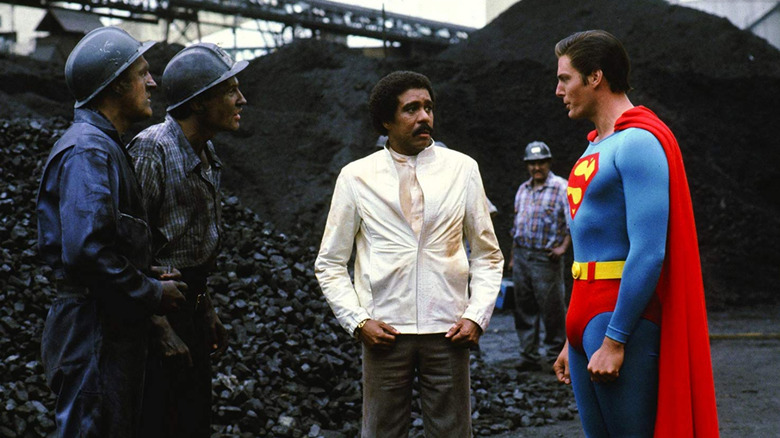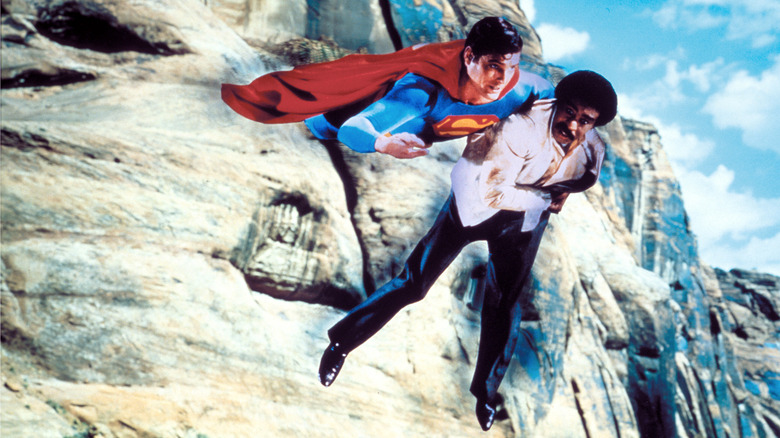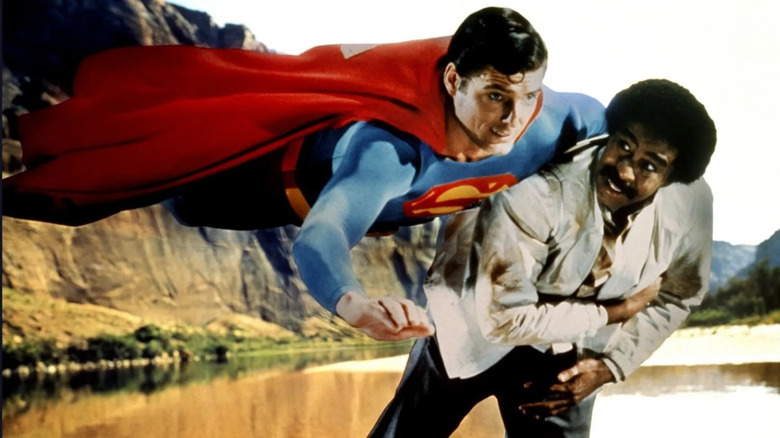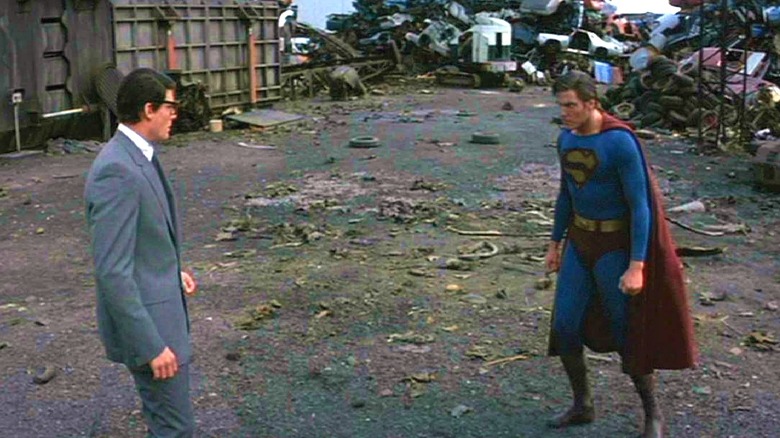Christopher Reeve Thought Richard Pryor's Casting Was What Sunk Superman III
In many successful film franchises, there may be said to be an unspoken "rule of threequels." This rule dictates that the third film in a series is where things begin to unravel. The thinking goes as follows: A film is a hit, establishing a new character or world into cinema. The sequel, banking on the success of the first, will be larger, more exciting, and is often more ambitious. By the third film, however, the filmmakers — in an effort to outdo film #2 — either have to ratchet the action up to a near-intolerable levels, or take the action in a "new direction," often with disastrous results. One can see this dynamic at play in "Alien³," "Terminator 3: Rise of the Machines," "Return of the Jedi," "Death Wish 3," "X-Men: The Last Stand," "The Fast and the Furious: Tokyo Drift," "Spider-Man 3," "RoboCop 3," and "Halloween III: Season of the Witch."
It's certainly the case with "Superman III," the first film in the series wholly directed by Richard Lester. Lester was credited as the sole director on 1980's "Superman II," but it's well known to fans that Richard Donner, the director of the 1978 "Superman" film, had already shot about three-quarters of the film before being replaced by Lester. Donner had a long career making adventure blockbusters. Lester, meanwhile, was a comedian, having helmed "A Hard Day's Night," "A Funny Thing Happened on the Way to the Forum," and two notably bawdy "Three Musketeers" movies. The two men had very different filmmaking philosophies.
The frustrating difference was noted by no one less than Superman actor Christopher Reeve. In his 1999 autobiography "Still Me," Reeve wrote about how Lester was keen on making "Superman III" funny, and felt that casting Richard Pryor was a boon. Reeve wholeheartedly disagreed.
The strange plot of Superman III
The plot of "Superman III" is more apt for a sitcom than a big-budget superhero film. In it, the legendary comedian Richard Pryor plays a hapless ne'er-do-well named Gus who, he finds, has an innate ability for computer programming. In the world of "Superman III," understanding (then-novel) computers was less a learned skill and more a secret superpower that only a chosen few possess. Gus uses computers to analyze and recreate Kryptonite in the hopes of weakening the Man of Steel. Kryptonite, however, is complex and alien, and Gus is not able to determine every element. He replaces the unknown parts with the tar found in cigarettes (!). The resulting Kryptonite turns Superman into an evil drunk.
Yes, it's all quite silly. The film's climax will feature a terrifying scene of a woman being forcibly turned into a robot by a malevolent machine intelligence. Pryor will be constantly present to crack wise. Gus plays a larger role in "Superman III" than even Superman. In his book, Christopher Reeve talks about how the producers were struck by a plea that Pryor idly made on a TV talk show one evening, and the entire movie was re-written to accommodate him:
"One night on the Johnny Carson show Richard Pryor raved about the Superman films and said how much he'd love to be in one. When they heard about it, [the film's executive producers] were excited by the idea that they might get Pryor to play some kind of comic villain in 'Superman III.' They approached him and received an immediate yes. David and Leslie Newman, the only writers left from the original group, were hired to write a movie that became more a Richard Pryor comedy vehicle than a proper Superman film."
Pryor is great, but...
Note that Richard Pryor was a giant in the world of standup comedy, and had multiple hit films of his own. The issue was that a comedian was inappropriate for a series that had spent two films establishing Superman as a mythic, larger-than-life hero. Converting the series into a comedy was, by Christopher Reeve's estimation, a poor decision. He even highlighted a particular "Superman III" scene that would have felt more in place in a Sylvester/Tweety cartoon short than in a Superman movie:
"The Newmans wrote a scene in which Pyror, wearing skis and sporting a pink tablecloth as a Superman cape, zooms off a little ski slope on the top of a high-rise. He falls down the side of the building and land — miraculously unhurt — in the middle of traffic on a busy street, then waddles toward the sidewalk, oblivious to all the honking horns and staring pedestrians. I personally found all that in poor taste."
Reeve then added how much he missed working with Richard Donner. He did add, though, that "Superman III" had at least one notable scene. The cigarette Kryptonite eventually bifurcates Superman into separate good and evil beings, and the two of them fight. Reeve liked that, writing:
"I missed Donner tremendously, and what we'd created just two years earlier. I did enjoy the sequence in which Superman has become an evil version of himself and tries to kill Clark Kent in an automobile junkyard. That scene stands alone; I think the rest of 'Superman III' was mostly a misconception."
The Telly Savalas joke
And it could have been even worse. Indeed, Richard Donner himself once complained about what might have been the worst, most whimsical gag in a Superman movie. It seems that multiple screenwriters and producers wanted "Superman" to be more broadly slapstick than it was, and someone actually thought to include a cameo from actor Telly Savalas, reprising his role from the hit 1978 detective show "Kojak." Yes, Savalas was to include his signature catchphrase. Wisely, the gag was written out. In Reeve's words:
"In the first draft of 'Superman' was a scene in which Superman sees a bald man walking down the street. Thinking it's Lex Luthor he swoops down to collar him and take him away. But it's Telly Savalas, who says, 'Who loves ya, baby?' to the startled Superman and offers him a lollipop. This was the kind of inane material that Dick Donner got rid of immediately."
Adapting Superman into a feature film seems weirdly difficult. Donner managed to make two excellent Superman movies in 1978 and in 1980 (Donner's intended version of "Superman II" was mostly salvaged for an eventual DVD release), but it has largely been downhill ever since. "Superman III" was silly, and the Cannon Group-produced "Superman IV: The Quest for Peace" was unbearably cheap. Tim Burton was infamously unable to make his "Superman Lives," while Bryan Singer's 2006 homage-sequel "Superman Returns" was more a monument than a film. Later, Zack Snyder's 2013 Superman film "Man of Steel" was clunky, overwrought, destructive, and nearly unbearable, often using florid prose to cover its overall aesthetic shallowness.
Another great Superman movie might be made someday, but the world is still waiting.



